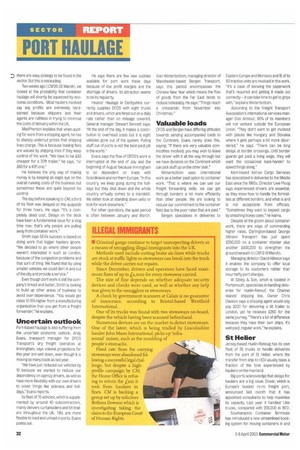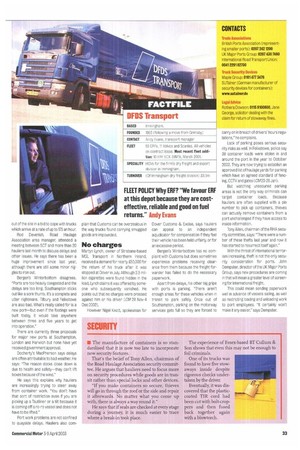orld's fourth-largest ass of port traffic. Nearly might are handled
Page 31

Page 32

Page 33

If you've noticed an error in this article please click here to report it so we can fix it.
by UK ting the huge potential vers. Rates aren't high, the right gear can Sheppard reports.
Few hauliers are attracted to port-related work these days but expansion can be rapid for those prepared to take the plunge. Ipswich-based SEA Transport has grown from two vans to eight artics over the last two years and now plans to add three more to its fleet later this year.
Joint owner Robin Smith says turnover has jumped from 1140.000 in its first year to £400,000 last year. "I would think that this year we would be up to between £600,000 and £700,000," he predicts.
Another new entrant, DH Docherty 8t, Son of Felixstowe, has more than doubled in size to nine trucks over the last 14 months. General manager John MacPherson says: "This year, we're going to review whether to increase again or replace our existing trucks."
The announcement in March by P&D that profits from its container business rose 16% in 2002 to 2.99m adds to the impression that there are easy pickings to be found in the sector. But this is misleading.
Two weeks ago (CM 20-26 March), we looked at the probability that container haulage will shortly be squeezed by economic conditions. Most hauliers involved say any profits are extremely hardearned because shippers and their agents are ruthless in trying to minimise the costs of delivery within the UK.
MacPherson explains that when quoting for work from a shipping agent, he has to sharply undercut prices that shipping lines charge. This is because loading fees are waived by shipping lines if they keep control of the work. "We have to be £40 cheaper for a 20ft trailer," he says, "or £60 for a 40ft one."
He believes the only way of making money is by keeping an eagle eye on the overall running costs of the business but sometimes these are quite beyond his control.
The day before speaking to CM, a third of his fleet was delayed on the quayside for three hours, He says: "It's a completely dead cost. Delays on the dock have been a fundamental issue for a long time now; that's why people are pulling away from container work."
Smith says SEA's success is based on doing work that bigger hauliers ignore. "We decided to go where other people weren't interested in such as London, because of the congestion problems and that sort of thing. We found that by using smaller vehicles we could dart in and out of the city and provide a service."
Even though port work is still the company's bread and butter, Smith is looking to build up other areas of business to avoid over-dependence. "You would get rates 10-15% higher from a manufacturing organisation than you get from a freight forwarder," he explains.
Uncertain outlook
Port-based haulage is also suffering from the uncertain economic outlook. Andy Evans, transport manager for DFDS Transport's dry freight operation at Immingham, says volume projections for this year are well down, even though it is moving as many loads as last year.
'We have just reduced our vehicles by 10 because we wanted to reduce our dependency on agency drivers, as well as have more flexibility with our own drivers to cover things like sickness and holidays," Evans reports.
Its fleet of 70 vehicles, which is supplemented by around 40 subcontractors, mainly delivers curtainsiders and tilt trailers throughout the UK. Tilts are more flexible to load and unload in ports, Evans points out. He says there are few new subbies available for port work these days because of low profit margins and the shortage of drivers. Its attraction seems to be its regularity.
Heanor Haulage in Derbyshire currently supplies DFDS with eight trucks and drivers, which are hired out on a daily rate rather than on mileage covered. General manager Stewart Bennett says: "At the end of the day, it makes a contribution to overhead costs but it is eight vehicles gone out of the system. Pulling stuff out of ports is not the best-paid job in the world."
Evans says the flow of DFDS's work is interrupted at the end of July and the beginning of August because Immingham is so dependent on trade with Scandinavia and northern Europe. "In this country, we keep going during the holidays but they shut down and the whole country virtually comes to a standstill. We either look at standing down units or look for work elsewhere."
For other operators, the quiet period is often between January and March. Alan Winterbottom, managing director of Manchester-based Bergen Transport, says this period encompasses the Chinese New Year which means the flow of goods from the Far East tends to reduce noticeably. He says: "Things reach a crescendo from November into Christmas."
Valuable loads
DFDS and Bergen have differing attitudes towards sending accompanied loads to the Continent. Evans rarely does this, saying: "If there are very valuable commodities involved, you may wish to leave the driver with it all the way through but we have divisions on the Continent which can pick stuff up on the other side."
Winterbottom sees international work as a better paid option to container work. "That is where we can use our freight forwarding skills; we can get through borders a lot more efficiently than other people. We are looking to reduce our commitment to the container field due to the poor rates that are paid."
Bergen specialises in deliveries to Eastern Europe and Morocco and 15 of its 60 tractive units are involved in this work. "It's a case of knowing the paperwork that's required and getting it made out correctly—it can take time to get to grips with," explains Winterbottom, According to the Freight Transport Association's international services manager Don Armour, 80% of its members will not venture outside the European Union. "They don't want to get involved with places like Hungary and Slovakia where it gets perhaps a bit more disordered," he says. 'There can be long delays at border crossings. Until border guards get paid a living wage, they will want the occasional back-hander to speed things along."
Kent-based Astran Cargo Services has specialised in deliveries to the Middle East since the 1960s. Director Uwe Ploog says experienced drivers are essential, as they know how to handle the formalities at different borders, and what is and is not acceptable from officials. "Sometimes they want to inspect cargo by smashing boxes open," he warns.
Despite all the gloom about container work, there are ways of commanding higher rates. Darlington-based George Allinson Transport has just spent £250,000 on a container stacker plus another £400,000 to strengthen the ground beneath it (CM13-19 March).
Managing director David Allinson says it enables the company to offer local storage to its customers rather than incur hefty port charges.
W Sibley & Son, which is located in Portsmouth, specialises in handling deiiveries for Huelin-Renouf, the Channel Islands' shipping line. Owner Chris Davison says a shipping agent would only pay 1220 for delivering a tilt trailer to London, yet he receives £260 for the same journey. "There's a lot of difference because they have their own ships. It's well-paid, regular work," he explains.
St Helier
Jersey-based Huelin-Renoug has its own fleet of 35 trucks to handle deliveries from the port of St Helier, where the transfer from ship to HGV usually takes a fraction of the time experienced by hauliers on the mainland.
Big ports acknowledge that delays for hauliers are a big issue. Dover, which is Europe's busiest ro-ro freight port, announced last month that it has appointed consultants to help maximise its capacity. Last year it handled 1.8m trucks, compared with 200,000 in 1912.
Southampton Container Terminals has introduced a new streamlined booking system for moving containers in and out of the site in a bid to cope with trucks which arrive at a rate of up to 175 an hour.
Rod Devenish, Road Haulage Association area manager, attended a meeting between SCT and more than 20 hauliers last month to discuss delays and other issues. He says there has been a huge improvement since last year, although there are still some minor niggles to iron out.
Bergen's Winterbottom disagrees. "Ports are too heavily congested and the delays are too long. Southampton sticks out like a sore thumb. It's a complete and utter nightmare. Tilbury and Felixstowe are also bad. What's really called for is a new port—but even if the footings were buitt today, it would take anywhere between three and five years to get into operation."
There are currently three proposals for major new ports at Southampton, London and Harwich but none have yet received government approval.
Docherty's MacPherson says delays are often attributable to bad weather. He says: "The reason docks close down is due to heath and safety—they can't lift boxes because of the wind."
He says this explains why hauliers are increasingly trying to steer away from container work. "You don't have that sort of restriction even if you are picking up a Tautliner or a tilt because it is coming off a ro-ro vessel and does not have to be lifted."
Port work problems are not confined to quayside delays. Hauliers also corn plain that Customs can be overzealous in the way trucks found carrying smuggled goods are impounded.
No charges
Martyn Lynch, owner of Strabane-based MGL Transport in Northern Ireland, received a demand for nearly 250,000 for the return of his truck after it was stopped at Dover in July. Although 2.5 million cigarettes were found hidden in the load, Lynch claims it was offered by someone who subsequently vanished. He points out that no charges were pressed against him or his driver (CM 28 Nov-4 Dec 2002).
However Nigel Knott, spokesman for Dover Customs & Excise, says hauliers can appeal to an independent adjudicator for compensation if they feel their vehicle has been held unfairly, or for an excessive period.
Bergen's Winterbottom has no complaint with Customs but does sometimes experience problems receiving clearance from them because the freight forwarder has failed to do the necessary paperwork.
Apart from delays, his other big gripe with ports is parking. "There aren't enough areas for these vehicles when in transit to park safely. Once out of Southampton, parking on the motorway services gets full so they are forced to carry on in breach of drivers' hours regulations," he complains.
Lack of parking poses serious security risks as well. In Felixstowe, police say 38 container loads were stolen in and around the port in the year to October 2002. They are now trying to establish an approved list of haulage yards for parking which have an agreed standard of fencing, CCTV and gates (CM23-29 Jan).
But watching unsecured parking areas is not the only way criminals can target container loads. Because hauliers are often supplied with a pin number to pick up containers, thieves can actually remove containers from a port unchallenged if they have access to inside information, Tony Allen, chairman of the RHA security committee, says: "There were a number of these thefts last year and now it has started to resurrect itself again."
With the threat of international terrorism increasing, theft is not the only security consideration for ports. John Dempster, director of the UK Major Ports Group, says new procedures are coming in that will mean a greater level of screening for international freight.
This could mean sending paperwork well in advance of vessels sailing, as well as restricting loading and unloading work to port employees. "It certainly won't make (lacy easier," says Dempster.
































































































































































